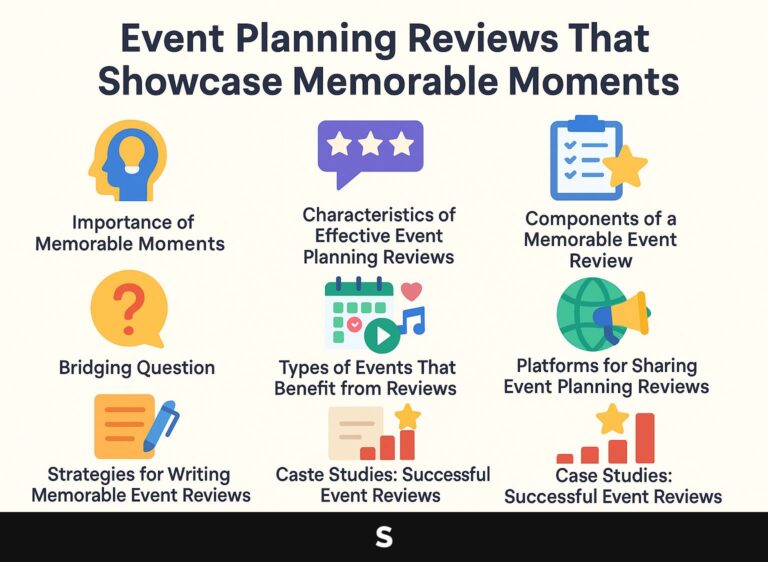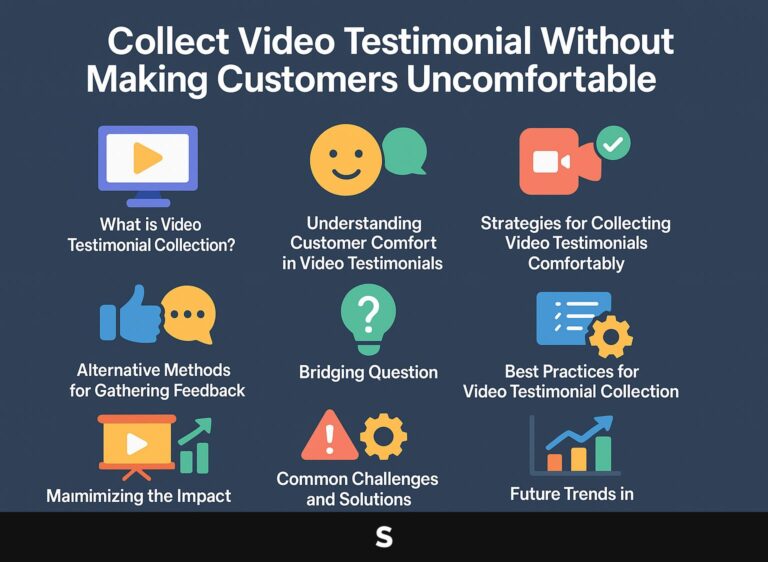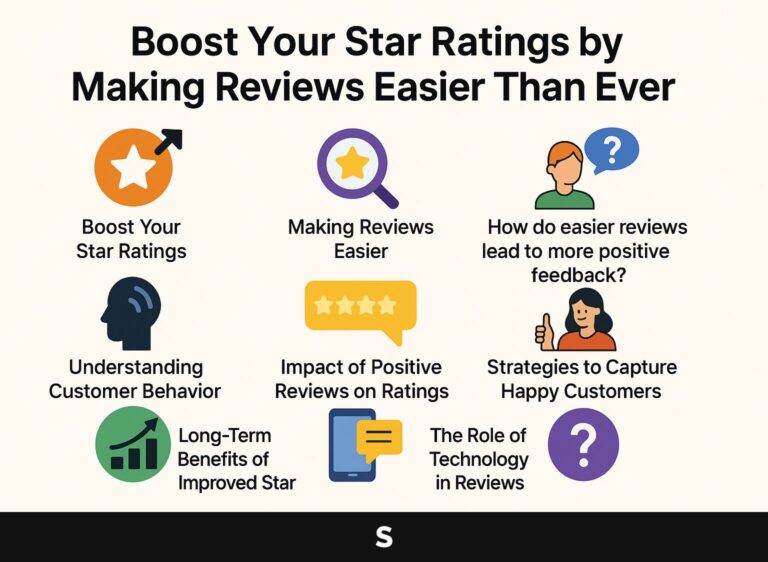Pediatric Clinic Reviews That Ease Parent Concerns
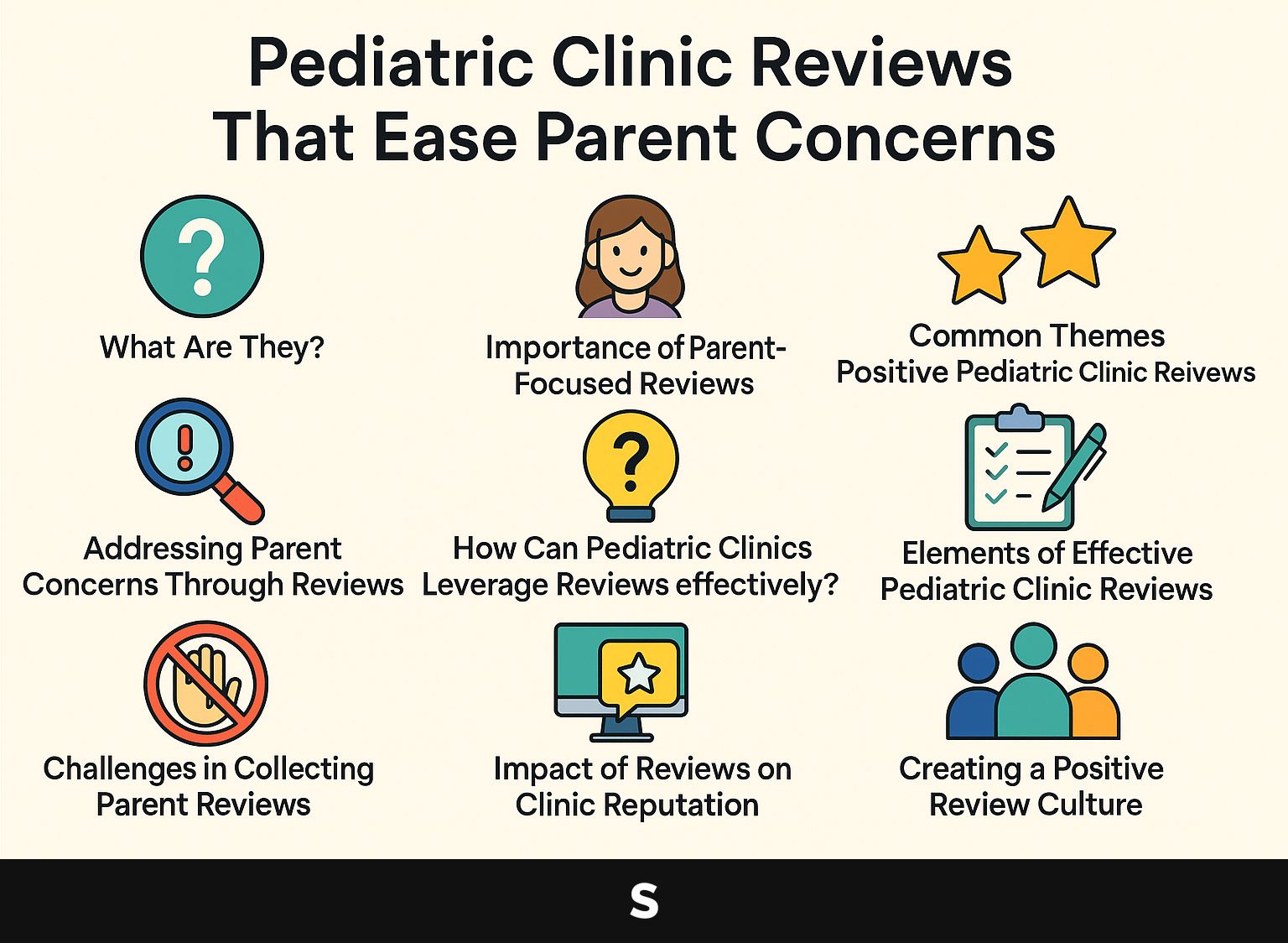
Finding the right pediatric clinic can feel overwhelming, especially when concerns about your child’s health-be it physical, behavioral, or emotional-are at stake. Real reviews from other parents offer important information about the quality of children’s primary care and the success of parenting programs.
In this article, we’ll talk about how reviews for parents can reduce common worries, benefit mental health, and help choose the right healthcare provider for your family. Learn how these testimonials can help you find caring and focused attention for your child.
Key Takeaways:
- Real feedback from parents greatly influences how people view a pediatric clinic and its doctors.
- Clear communication, staff friendliness and after-hours accessibility are key themes in positive pediatric clinic reviews.
- Pediatric clinics can use technology like social media and AI to gather and share real parent reviews, helping to improve their reputation and encourage patients to return.
- Pediatric Clinic Reviews That Ease Parent Concerns – What Are They?
- Importance of Parent-Focused Reviews
- Common Themes in Positive Pediatric Clinic Reviews
- Addressing Parent Concerns Through Reviews
- Elements of Effective Pediatric Clinic Reviews
- Challenges in Collecting Parent Reviews
- Impact of Reviews on Clinic Reputation
- Creating a Positive Review Culture
- How Technology Helps in Collecting Reviews
- Upcoming Developments in Pediatric Clinic Assessments
- Frequently Asked Questions
- 1. What are pediatric clinic reviews that ease parent concerns?
- 2. How can pediatric clinic reviews help parents?
- 3. What makes a good pediatric clinic review?
- 4. Are pediatric clinic reviews reliable?
- 5. How can I find pediatric clinic reviews?
- 6. How can I use feedback from pediatric clinics to help me choose?
Pediatric Clinic Reviews That Ease Parent Concerns – What Are They?
Reviews of pediatric clinics are important resources for parents. They help parents decide on healthcare providers by sharing personal experiences.
1. How do reviews influence parent decisions for pediatric clinics?
Research shows that 84% of parents rely on online reviews as much as personal recommendations when selecting a pediatric clinic.
In fact, clinics with more than 50 positive reviews are 70% more likely to attract new patients than those with fewer. A study indicates that parents prefer clinics with a high rating-typically above 4 stars-over those with mixed or poor feedback.
This highlights the importance for clinics to actively manage their online presence. Strategies include:
- Asking happy parents to write reviews often
- Quickly dealing with any bad feedback to show that you respond to concerns
By cultivating a positive online reputation, clinics can significantly influence parental choice and trust.
2. What specific aspects do parents look for in clinic reviews?
Parents usually look for information about how the pediatrician communicates, the feel of the clinic, and how quickly the staff responds when they read reviews.
To improve your clinic reviews, think about mentioning specific details like wait times, as they can influence the overall experience; staff friendliness, which affects comfort during visits; and access to the clinic after hours, which is important when needed.
You can also ask parents to share their experiences with appointment scheduling and whether the office environment felt welcoming. These details can guide other parents in choosing the right pediatrician while providing actionable feedback to the clinic for improvement.
Importance of Parent-Focused Reviews
Honest feedback from parents is key for gaining trust and ensuring pediatric clinics meet the needs of families.
1. Why are genuine reviews important for pediatric clinics?
Honest reviews build the trustworthiness of pediatric clinics, resulting in more patient trust and loyalty.
Clinics can use patient reviews effectively by communicating with parents after their appointment. For example, Sunshine Pediatric Clinic saw a 30% increase in positive ratings after implementing a follow-up survey system.
The clinic asked for feedback through email and urged people to leave reviews on Google and Yelp, which helped create a community feeling. They shared positive experiences on their website and social media, featuring testimonials that connect with potential patients.
This method educates possible clients and shows dedication to bettering patient experiences, which increases loyalty.
2. How do reviews impact the perception of pediatricians?
People often form their opinions about pediatricians based on online reviews. Good reviews can improve how they are seen in the community.
Studies show that a 1-star increase in ratings can lead to a 5-9% rise in patient volume. Practices that actively manage their online reputation, using tools like Reputation.com or Healthgrades, often notice a marked improvement in patient trust and appointment bookings.
For instance, a pediatric clinic in Chicago increased its monthly consultations by 30% after enhancing their review scores from 3.5 to 4.5 stars through focused patient engagement and response strategies. Regularly checking reviews helps pediatricians quickly respond to issues and build better relationships with patients.
Common Themes in Positive Pediatric Clinic Reviews
Positive reviews for pediatric clinics frequently emphasize consistent themes that connect with parents, highlighting the aspects of care they appreciate the most.
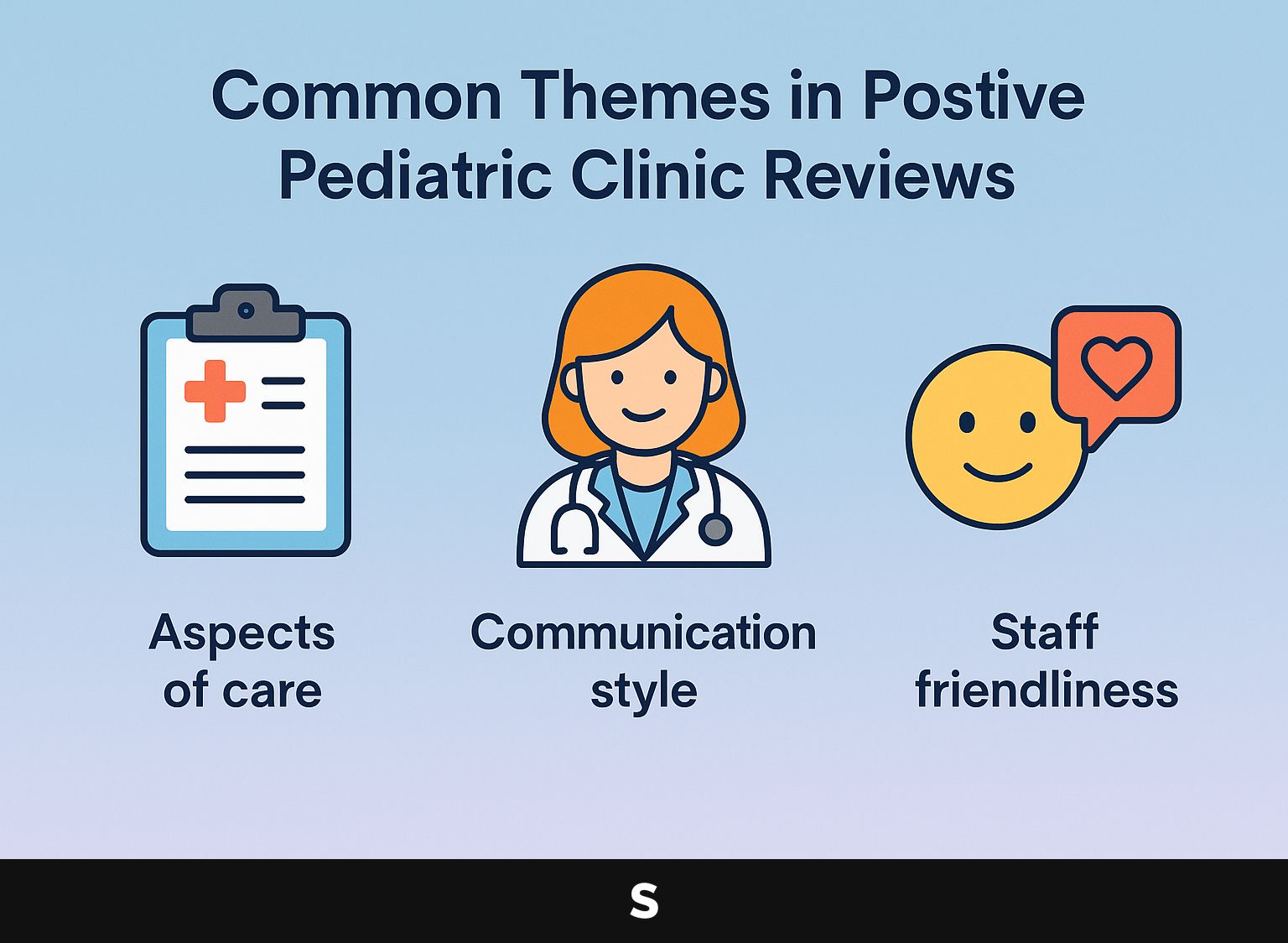
1. What aspects of care do parents appreciate the most?
Parents frequently express appreciation for pediatricians who demonstrate empathy, thoroughness, and proactive communication regarding their child’s health.
Pediatricians can improve their practice by focusing on a few key strategies.
- First, implementing a patient feedback system allows parents to voice concerns and experiences. Clinics can use tools like SurveyMonkey or Google Forms to collect feedback regularly.
- Second, establishing routine follow-up calls or messages about ongoing treatments helps reinforce care and builds trust.
- Creating a family centered environment, which includes educating parents about their child’s conditions and encouraging questions, promotes a strong rapport.
These practices make patients happier and help build lasting connections between families and their healthcare providers.
2. How does a pediatrician’s communication style affect reviews?
The communication style of pediatricians directly influences the tone and sentiment of patient reviews, often determining a family’s comfort level during visits.
To improve these communication skills, pediatricians can gain from focused training programs that teach empathy, active listening, and simple explanations.
Workshops like the `Pediatric Communication Course’ provide role-playing scenarios to practice difficult conversations. Using tools like the ‘Teach-Back’ method helps parents fully grasp their child’s care plan.
Including feedback sessions after patient visits helps with ongoing improvement, allowing practitioners to change their approach based on family needs and preferences.
3. What role does staff friendliness play in reviews?
Staff friendliness is a critical component of patient experiences and is frequently cited in positive clinic reviews by parents.
Creating a welcoming environment can significantly increase patient satisfaction and their likelihood to come back. To promote positive interactions, implement staff training programs focusing on empathy, effective communication, and active listening.
For example, role-playing scenarios can help staff handle tough conversations, while workshops on emotional intelligence can build stronger connections with patients.
Regularly soliciting feedback through surveys can identify areas for improvement. By prioritizing staff training and cultivating a culture of kindness, clinics can nurture an atmosphere that patients are likely to return to and recommend to others.
Addressing Parent Concerns Through Reviews
Reviews of pediatric clinics help answer frequent worries parents have about medical appointments.
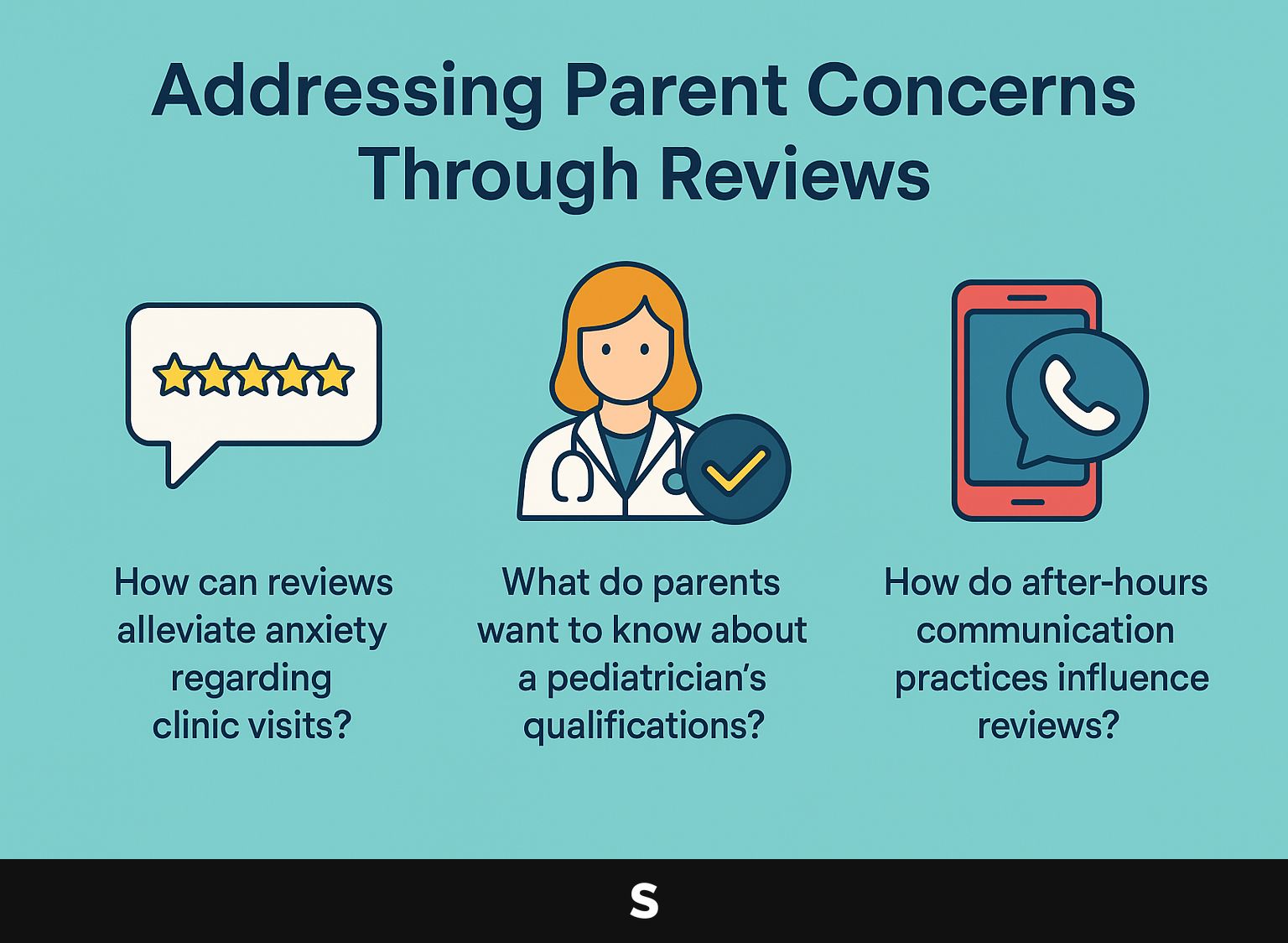
1. How can reviews alleviate anxiety regarding clinic visits?
Positive reviews can significantly alleviate anxiety by providing parents with reassurance about the care their children will receive during clinic visits. To share these stories well, clinics can add a part to their website that shows feedback from families.
Highlight specific experiences, such as mentions of friendly staff or positive interactions during appointments. Tools like Google My Business allow clinics to respond to reviews, showing prospective parents that their concerns are valued.
Sharing video testimonials on social media channels can bring the reviews to life, connecting emotionally with viewers and enhancing trust in the clinic’s services.
2. What do parents want to know about a pediatrician’s qualifications?
Parents often want to know a pediatrician’s credentials and background before selecting a clinic.
To aid their decision, clinics should highlight specific qualifications that parents prioritize. Key elements include board certification, which shows the pediatrician has met strict standards, and relevant experience in areas such as pediatric cardiology or endocrinology for specific health concerns.
Parents appreciate information on years of practice, hospital affiliations, and patient reviews that reflect their experiences. By clearly showing this information on profiles and encouraging reviews, clinics can create trust and help parents make informed decisions.
3. How do after-hours communication practices influence reviews?
Good communication after regular hours can significantly improve pediatric care and lead to better parent feedback. Clinics can use some methods to make communication easy and clear. A useful method is to employ an after-hours call service that connects parents with trained nurses who can quickly provide advice.
For instance, the use of platforms like MDLive allows for 24/7 access to healthcare providers. Employing text or chat services, such as Zocdoc, offers parents a convenient way to ask questions without the stress of a phone call.
Sending regular follow-up messages can help keep parents informed and happy, building trust in the practice.
4. How can pediatric clinics use reviews effectively?
Pediatric clinics can use reviews to increase their visibility and improve communication with patients. To effectively use reviews, clinics should routinely monitor platforms like Google My Business and Healthgrades.
When clinics quickly reply to patient feedback-whether good or bad-they show they care and are dedicated to providing good service. Incorporating testimonials into marketing materials, such as brochures or social media posts, can build trust with potential patients.
Think about using tools like Podium or Trustpilot, which make it easier to ask for and manage reviews. Regularly study review patterns to find ways to make services better, so patients have a better experience all the time.
Elements of Effective Pediatric Clinic Reviews
Good reviews of pediatric clinics include key information that helps parents choose the best healthcare for their children.

1. What specific details make a review impactful for parents?
Including specific details like personal experiences and clear mentions of staff interactions can greatly improve the effect of reviews for parents.
For example, a review that mentions a teacher adjusting their method to suit a child’s needs gives useful information. Encourage parents to recount moments like a child’s breakthrough in learning, or how staff responded to a concern.
Tools like Google Reviews or Facebook can facilitate sharing these stories. By focusing on anecdotes-such as a memorable field trip or a supportive staff member-reviews become more relatable and helpful to other families looking for the right environment for their children.
2. How do personal stories improve the trustworthiness of reviews?
Personal stories shared in reviews can provide a deeper level of credibility and emotional connection for prospective patients considering a clinic.
Clinics can make these stories more effective by setting up places where parents can talk about what they’ve been through. For instance, testimonials can be featured prominently on the clinic’s website or social media.
Holding local gatherings where families can tell their stories face-to-face builds trust and connection. Tools like SurveyMonkey can gather feedback, while platforms such as Yelp or Google Reviews allow for wider sharing.
By sharing these personal stories, clinics gain trust and connect with potential patients in a more personal way.
3. What are the best practices for writing a review?
Best practices for writing reviews include being honest, specific, and constructive, which can help parents convey their experiences effectively.
To write impactful reviews, start by detailing a specific experience, such as how a product has affected your child’s routine. Mention the pros and cons clearly, like the durability of a toy versus its price.
Use tools like Grammarly to check grammar and Canva to create clean images. Engage readers by invoking emotions, such as describing how a children’s book sparked your child’s imagination.
Remember to keep it short and to the point, so potential buyers can quickly understand your thoughts.
Challenges in Collecting Parent Reviews
Pediatric clinics often struggle to gather helpful feedback from parents, which can make it harder for them to make their services better.

1. What barriers do clinics face in gathering feedback?
Clinics often encounter barriers such as time constraints, lack of awareness, and parents’ reluctance to share experiences when gathering feedback. To solve these problems, clinics can set up an easy feedback system.
Start by creating brief, easy-to-complete surveys that can be sent via text or email immediately after appointments. Tools like SurveyMonkey or Google Forms can facilitate this with customizable templates.
Think about giving small rewards, like discounts for their next visit or a chance to win a prize, to encourage parents to join in.
Actively promote the importance of feedback through informational flyers in waiting areas, helping to raise awareness and encourage more parents to share their thoughts.
2. How can clinics encourage more parents to leave reviews?
Clinics can use different methods to get more parents to leave reviews, which will help them gather more feedback.
One effective approach is to implement a follow-up email campaign after appointments. Send a thank-you email that has a direct link to your review site, so parents can easily share their thoughts.
Think about adding a reminder for parents to leave a review during checkout, so they remember their visit clearly. Build an easy-to-use system for submitting reviews using tools like Google My Business or Facebook, to make the process simpler and encourage more people to take part.
Impact of Reviews on Clinic Reputation
The general opinion about a pediatric clinic greatly depends on its reviews, which affect patients’ trust and their decision to return. For clinics looking to enhance their reputation, understanding and leveraging positive review examples can be crucial.
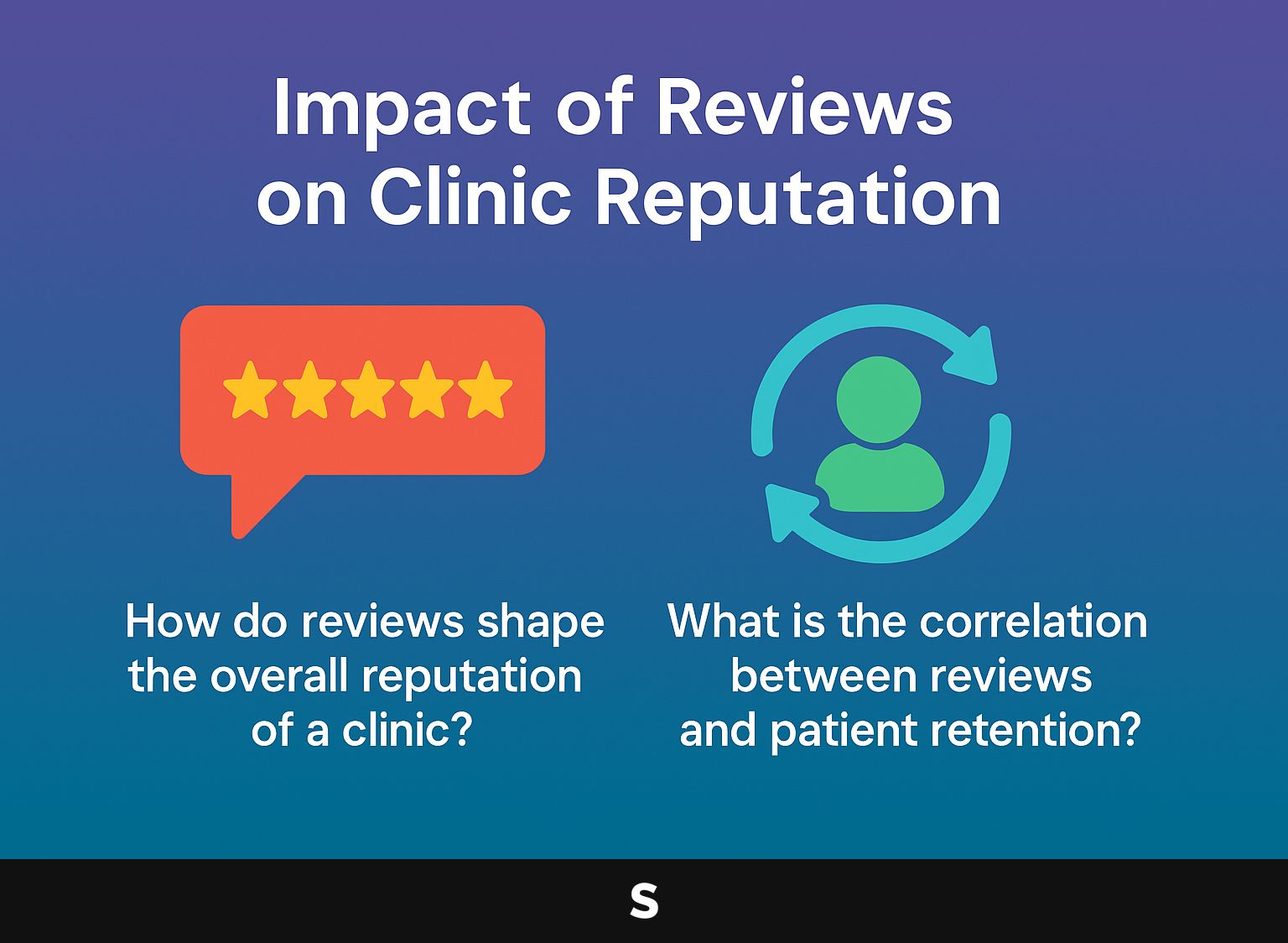
1. How do reviews shape the overall reputation of a clinic?
Reviews play a critical role in shaping the public perception of clinics, with positive reviews enhancing reputation and negative reviews potentially harming it.
Clinics can improve their online reputation by asking happy patients to write reviews and quickly responding to negative comments.
For example, Cascade Orthopedic Surgery improved its rating from 3.8 to 4.5 stars on Google by engaging with patients on social media and highlighting positive testimonials on their website.
Green Valley Dental set up a system to remind happy clients to post their feedback online, leading to a 30% rise in good reviews over six months. By focusing on being quick to respond and open with information, clinics can build trust and bring in new patients.
2. What is the correlation between reviews and patient retention?
Research indicates a strong correlation between positive reviews and patient retention rates, suggesting that feedback directly influences ongoing patient relationships.
To keep more patients, clinics should actively gather and act on feedback from them. Regularly send follow-up surveys after appointments using tools like SurveyMonkey or Google Forms, aiming for a response rate of at least 30%.
Set up a way to quickly reply to reviews on sites like Healthgrades or Yelp to show that you care about patient feedback. Consider planning meetings every three months to create a sense of community and encourage patients to remain loyal.
These strategies promote positive reviews and pinpoint areas that need improvement, which leads to better retention rates.
Creating a Positive Review Culture
Building a positive feedback culture in pediatric clinics can lead to better reviews and more satisfied patients. To enhance this culture, it’s essential to understand how to effectively solicit opinions from clients, which can be explored further in our guide on Mastering The Art Of Asking For Reviews.
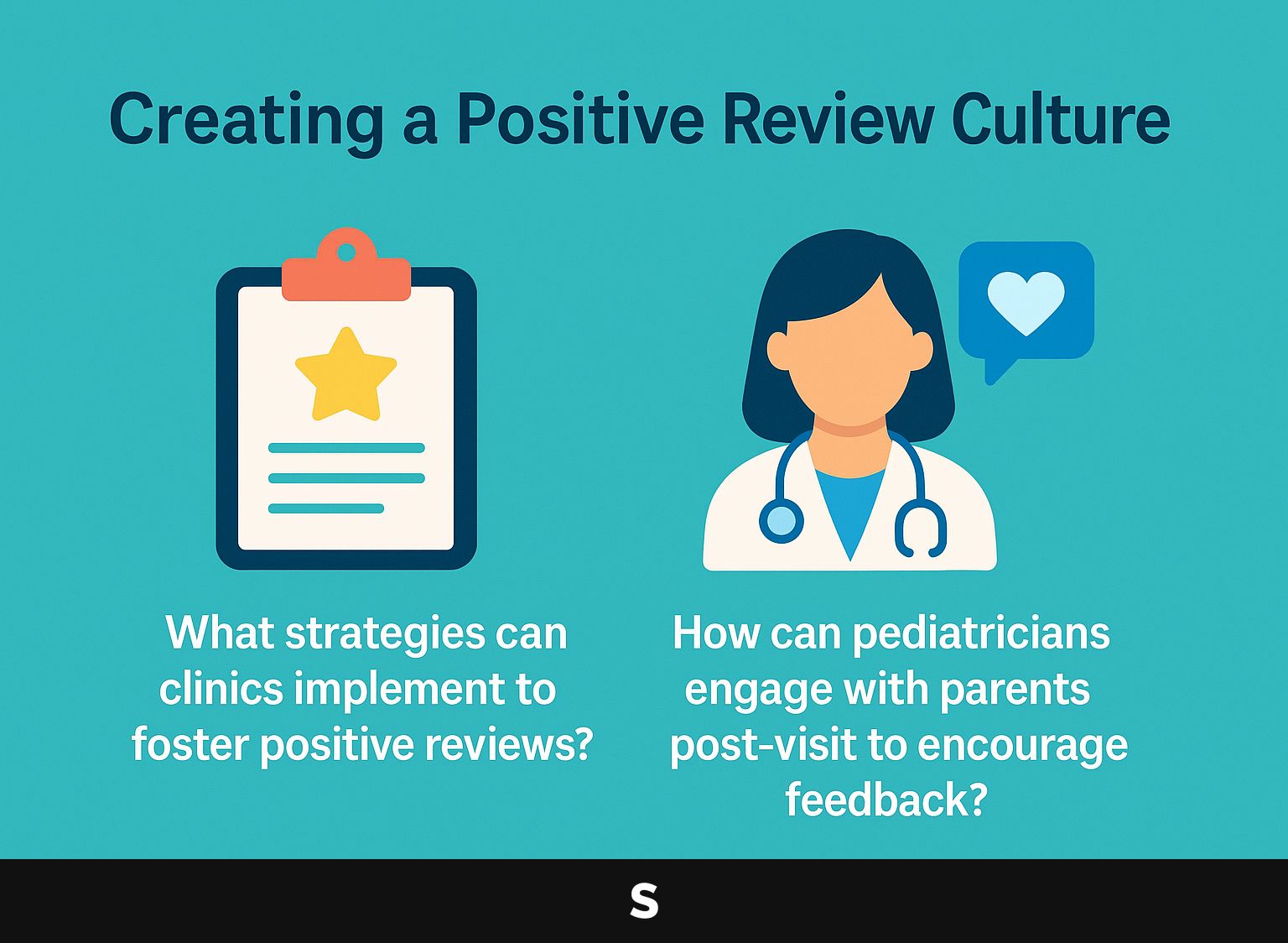
1. What steps can clinics take to encourage positive reviews?
Clinics can use particular methods to encourage positive reviews, which can greatly improve their reputation.
One effective approach is to recognize and reward staff for positive patient interactions. For instance, consider implementing a ‘Patient Experience Award’ that highlights team members who excel in service.
Simplify how customers submit reviews by using tablets in the waiting area. Allow patients to quickly share their feedback right after their appointment by providing clear messages and links.
Responding professionally to both positive and negative reviews demonstrates that you value patient feedback, which can encourage more people to share their experiences.
2. How can pediatricians engage with parents post-visit to encourage feedback?
After their visit, getting parents involved can help them share their thoughts and improve the clinic’s reviews a lot.
To increase interaction after a visit, send thank-you emails within a day, showing appreciation for their visit. Add a short survey link for feedback, so parents can easily provide their opinions. Follow up with a phone call a week later, asking if they have any further questions or need support.
This proactive approach encourages parents to leave positive reviews on platforms such as Google and Yelp, boosting your clinic’s reputation and attracting new patients.
How Technology Helps in Collecting Reviews
As technology has improved, it’s become easier to gather reviews. Modern tools help businesses get customer feedback quickly and accurately. These tools include online surveys, email requests, and review platforms that simplify the process.
Using these methods, companies can get useful feedback to make their products and services better. This helps businesses know what customers want and prefer. As a result, businesses can make informed choices to improve customer satisfaction and loyalty.
Technology helps pediatric clinics collect and study parent reviews, improving the way they get feedback.
1. What platforms are most effective for collecting pediatric clinic reviews?
Effective platforms for collecting pediatric clinic reviews include Google My Business, Healthgrades, and Yelp, each offering unique advantages.
Google My Business is highly effective for local visibility, allowing clinics to showcase reviews prominently in search results.
Healthgrades focuses on doctors and other healthcare professionals, making it a great place for patients looking for medical care to connect with them. Yelp is particularly beneficial for building community engagement through user feedback and photos.
To improve profiles, make sure business details are correct, ask happy patients to write reviews, and reply to feedback quickly. This creates confidence and improves the clinic’s standing.
Social media serves as a powerful tool for influencing the review process, enabling clinics to engage with parents in real-time.
Clinics can implement strategies such as creating engaging posts that encourage families to share their experiences. For example, using visuals like before-and-after photos or patient testimonials can spark interest.
Replying quickly to comments and reviews shows that you care and helps build trust. Tools like Hootsuite can help manage responses across platforms, ensuring no feedback goes unnoticed.
Holding campaigns or contests, where participants share their positive experiences for a chance to win a prize, can encourage more reviews, increasing online visibility and reputation.
Upcoming Developments in Pediatric Clinic Assessments
The way people review pediatric clinics is changing, with new patterns forming that will influence how feedback is gathered and used. This evolution is often discussed alongside the broader impact of technology on customer experiences.
As mentioned in our analysis of Customer Experience and Technology: A Revolutionary Approach, leveraging the right tech tools can significantly enhance feedback collection and analysis.

1. What changes can we expect in the way reviews are collected?
Updates in technology and what patients want are changing how feedback from pediatric clinic visits is gathered and studied.
Clinics are increasingly using mobile feedback requests, which allow parents to submit reviews directly after appointments via SMS or app notifications.
For example, using platforms like Medallia or SurveyMonkey can make this process faster by triggering immediate responses. Clinics use automatic follow-ups to ask parents for feedback if they haven’t given it yet.
This approach raises response rates and makes instant changes in how services are provided based on patient feelings, which improves how the clinic responds and makes patients happier.
2. How might AI and analytics reshape review significance in healthcare?
AI and analytics are expected to change the importance of reviews in healthcare, enabling a more detailed and thoughtful analysis of feedback.
Clinics can use natural language processing (NLP) tools to study patient reviews and find frequent patterns and repeated problems.
For instance, platforms like Medallia and Qualtrics enable clinics to glean sentiment from patient comments, pinpointing areas needing improvement. Implementing regular analytics reports can help track patient sentiment over time, revealing shifts in perception following service changes.
Including these findings in team meetings can create a responsive work environment, where patient feedback directly guides improvements in services. This method turns feedback into practical plans that match what patients expect.
Frequently Asked Questions
1. What are pediatric clinic reviews that ease parent concerns?
Pediatric clinic reviews that ease parent concerns are feedback and opinions from other parents who have visited a specific pediatric clinic and have had positive experiences. These reviews can help ease the worries and concerns of parents who are looking for the right pediatric clinic for their child.
2. How can pediatric clinic reviews help parents?
Reading reviews of a pediatric clinic can give helpful information about the quality of care and services they provide. They can help parents make informed decisions about where to take their child for medical care and ease any worries or concerns they may have.
3. What makes a good pediatric clinic review?
A good pediatric clinic review should include details about the doctor’s bedside manner, the friendliness and attentiveness of the staff, and the overall atmosphere of the clinic. It should also address any specific concerns or anxieties a parent may have had and how they were addressed by the clinic.
4. Are pediatric clinic reviews reliable?
Although each visit might be different, reviews of pediatric clinics are usually trustworthy because they are written by parents who have actually used the clinic. However, you should read several reviews and avoid making a choice based only on a single review.
5. How can I find pediatric clinic reviews?
Many websites and online platforms are available for reviewing and rating children’s clinics. Parents can also ask for recommendations from friends and family or check with their child’s school for any recommendations.
6. How can I use feedback from pediatric clinics to help me choose?
When looking at pediatric clinic reviews, it’s important to read a variety of reviews and look for common themes or experiences. This can provide a clearer view of the clinic’s overall quality. Think about what matters most to your child and family when you look at reviews to make a decision.
